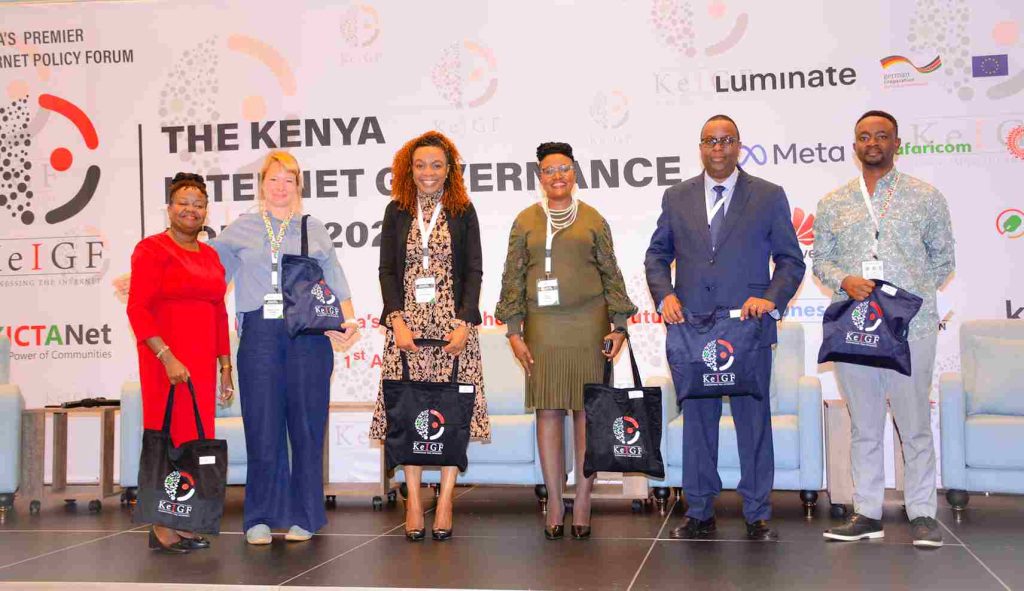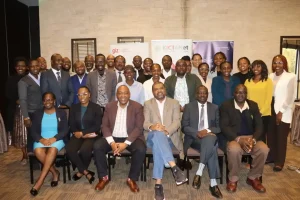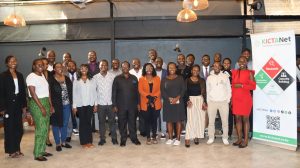The 17th Kenya Internet Governance Forum explored strategies for a collaborative digital future centred on building a multi-stakeholder digital future for the country.
Industry experts and government officials gathered to discuss ways to strengthen internet governance and create an inclusive digital ecosystem.
The panel, moderated by Dr Grace Githaiga, featured insights from Joseph Nzano, Deputy Director of the ICT Authority, Desmond Mushi from Meta Platforms Inc., Christin Schulz-Kaunga, Head of Programme at GIZ, Lillian Kiambati, Head of Service Management at Safaricom PLC, and Judith Ogutu from Paradigm Initiative.
Panellists emphasized the crucial role of governance and regulation in fostering a healthy Internet ecosystem while ensuring innovation thrives. “We need a balance between regulation and innovation to create a thriving digital environment,” said Joseph Nzano, Deputy Director of the ICT Authority. “Overregulation can stifle innovation, but without proper guidelines, we risk chaos.”
The need for inclusive processes was underscored by Desmond Mushi from Meta Platforms Inc. “It’s essential to involve all stakeholders in shaping the digital landscape. We must listen to the voices of marginalized communities and ensure that the benefits of the digital economy reach everyone,” he stated.

Dr Grace Githaiga, Christin Schulz-Kaunga, Head of Programme, Digital Transformation Centre Kenya, GIZ, Lillian Kiambati- Head of Service Management -Digital Transformation (Safaricom PLC), Judith Ogutu, Paradigm Initiative, Joseph Nzano, Deputy Director ICT Communications Authority, Desmond Mushi, Meta Platforms Inc after their “Building Kenya’s Multi-Stakeholder Digital Future” panel discussion.
Judith Ogutu from Paradigm Initiative highlighted the importance of digital rights and privacy. “Protecting citizens’ data and ensuring their online safety is paramount. We need strong data protection laws and enforcement mechanisms,” she emphasized.
Lillian Kiambati from Safaricom PLC underscored the role of the private sector in driving digital transformation. “Investment in infrastructure and digital skills is crucial for bridging the digital divide. Public-private partnerships are essential to achieve this goal,” she said.
Christin Schulz-Kaunga from GIZ emphasized the importance of international cooperation. “Digital challenges often require global solutions. We need to collaborate with other countries to share best practices and address common issues,” she noted.
The panel concluded by stressing the importance of collaboration, partnerships, and a multi-pronged approach to address the complex challenges and opportunities of the digital age. By working together, Kenya can build a digital future that is inclusive, secure, and prosperous for all.
“We need to keep engaging and applying ourselves as a whole society. We need to move out of the needs of policymaking. And I think second we need to consider practically three different dimensions together: Openness and fairness and that has been privacy and security,” Christin Schulz-Kaunga, Head of Programme, Digital Transformation Centre Kenya, GIZ emphasised.
![]()




